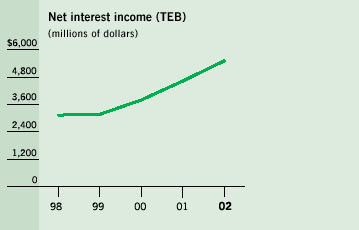Net interest income (TEB)
We calculate net interest income by adding the interest and dividends we earn from loans and securities, and subtracting the interest we pay on deposits and other liabilities.
Net interest income is calculated on a taxable equivalent basis (TEB), which means that the value of non-taxable or tax-exempt income such as dividends is adjusted to its equivalent before tax value. This allows us to measure income from all securities and loans consistently and makes for a more meaningful comparison of net interest income with other institutions.
See supplementary information page 35 and 36, tables 2, 3 and 4
(pdf)
Net interest income (TEB) was $5,522 million in 2002, a year-over-year increase of $886 million or 19%. Net interest income reported by TD Securities increased by $610 million as compared with the prior year, primarily related to the $605 million increase in interest income from trading securities. Net interest income at TD Canada Trust increased by $107 million as compared with the prior year. The increase at TD Canada Trust was attributable to personal loan volumes, excluding securitizations, which increased by $5 billion, and the net interest margin improvement of four basis points to 3.42%.
Net interest income (TEB) was $4,636 million in 2001, a year-over-year increase of $832 million or 22%. The increase in net interest income was a result of a $3 billion increase in TD Canada Trust’s personal loan volumes, excluding securitizations, and the full year impact of Canada Trust, compared with only nine months in fiscal 2000. In addition, an increased level of interest income from trading activity at TD Securities generated an increase in total net interest income.

|